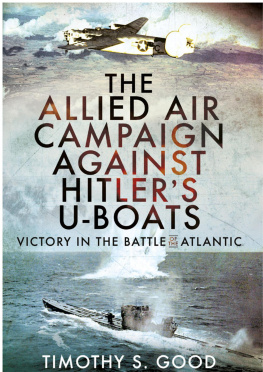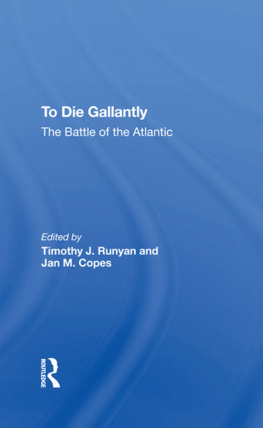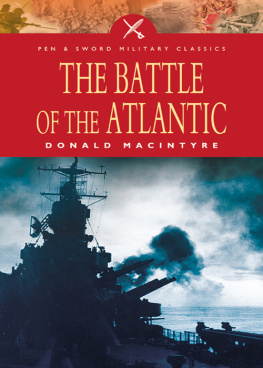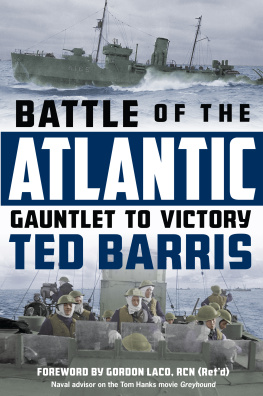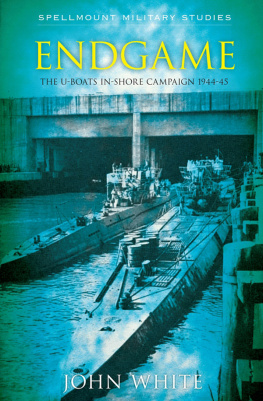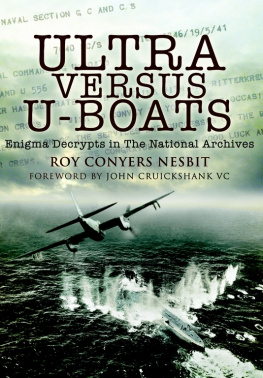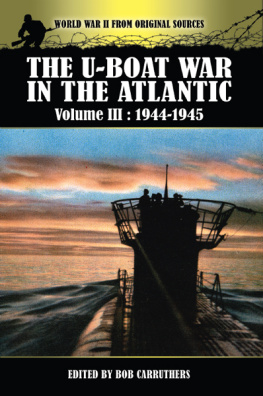Timothy S Good - The Allied Air Campaign Against Hitlers U-Boats: Victory in the Battle of the Atlantic
Here you can read online Timothy S Good - The Allied Air Campaign Against Hitlers U-Boats: Victory in the Battle of the Atlantic full text of the book (entire story) in english for free. Download pdf and epub, get meaning, cover and reviews about this ebook. year: 2022, publisher: Frontline Books, genre: Science. Description of the work, (preface) as well as reviews are available. Best literature library LitArk.com created for fans of good reading and offers a wide selection of genres:
Romance novel
Science fiction
Adventure
Detective
Science
History
Home and family
Prose
Art
Politics
Computer
Non-fiction
Religion
Business
Children
Humor
Choose a favorite category and find really read worthwhile books. Enjoy immersion in the world of imagination, feel the emotions of the characters or learn something new for yourself, make an fascinating discovery.
- Book:The Allied Air Campaign Against Hitlers U-Boats: Victory in the Battle of the Atlantic
- Author:
- Publisher:Frontline Books
- Genre:
- Year:2022
- Rating:4 / 5
- Favourites:Add to favourites
- Your mark:
- 80
- 1
- 2
- 3
- 4
- 5
The Allied Air Campaign Against Hitlers U-Boats: Victory in the Battle of the Atlantic: summary, description and annotation
We offer to read an annotation, description, summary or preface (depends on what the author of the book "The Allied Air Campaign Against Hitlers U-Boats: Victory in the Battle of the Atlantic" wrote himself). If you haven't found the necessary information about the book — write in the comments, we will try to find it.
Timothy S Good: author's other books
Who wrote The Allied Air Campaign Against Hitlers U-Boats: Victory in the Battle of the Atlantic? Find out the surname, the name of the author of the book and a list of all author's works by series.
The Allied Air Campaign Against Hitlers U-Boats: Victory in the Battle of the Atlantic — read online for free the complete book (whole text) full work
Below is the text of the book, divided by pages. System saving the place of the last page read, allows you to conveniently read the book "The Allied Air Campaign Against Hitlers U-Boats: Victory in the Battle of the Atlantic" online for free, without having to search again every time where you left off. Put a bookmark, and you can go to the page where you finished reading at any time.
Font size:
Interval:
Bookmark:
THE ALLIED
AIR CAMPAIGN
AGAINST HITLERS
U-BOATS
THE ALLIED
AIR CAMPAIGN
AGAINST HITLERS
U-BOATS
VICTORY IN THE BATTLE OF THE ATLANTIC
By Timothy S. Good


The Allied Air Campaign Against Hitlers U-boats
This edition published in 2021 by Frontline Books, an imprint of Pen & Sword Books Ltd, Yorkshire Philadelphia
Copyright Timothy S. Good.
ISBN: 9781 3990 96492
eISBN: 9781 3990 96508
Mobi ISBN: 9781 3990 96508
No part of this book may be reproduced or transmitted in any form or by any means, electronic or mechanical including photocopying, recording or by any information storage and retrieval system, without permission from the Publisher in writing.
Pen & Sword Books Ltd incorporates the imprints of Pen & Sword Archaeology, Air World Books, Atlas, Aviation, Battleground, Discovery, Family History, History, Maritime, Military, Naval, Politics, Social History, Transport, True Crime, Claymore Press, Frontline Books, Praetorian Press, Seaforth Publishing and White Owl
For a complete list of Pen & Sword titles please contact:
PEN & SWORD BOOKS LTD
47 Church Street, Barnsley, South Yorkshire, S70 2AS, UK.
E-mail: enquiries@pen-and-sword.co.uk
Website: www.pen-and-sword.co.uk
Or
PEN AND SWORD BOOKS,
1950 Lawrence Roadd, Havertown, PA 19083, USA
E-mail: Uspen-and-sword@casematepublishers.com
Website: www.penandswordbooks.com
To my brother, Travis
Thanks for all the Second World War discussions
And to the P-8 Poseidon crews, the direct descendants of the B-24 Liberator crews
Iwould to thank Dr Axel Niestle for his constant and outstanding expertise, Gene Finke and my dad for input, and to the great staff at the National Archives for all of their assistance and guidance.
This is the first book-length study of the Allied air campaign against the German U-boats in the Second World War. The Battle of the Atlantic has received attention from historians in countless publications. However, the attention has been focused on either the overall story of the battle such as Clay Blairs two-volume work entitled Hitlers U-Boat War , S.W. Roskills multi-volume The War at Sea: 19391945 and Dan Van der Vats The Atlantic Campaign: The Great Struggle at Sea or centred on limited aspects of the campaign such as U-boat operations, escort carrier operations or specific geographic areas. The Allied air campaign receives compartmentalised coverage, as evidenced in Alan C. Careys Sighted Sub: The United States Navys Air Campaign against the U-Boat , William T. YBloods Hunter Killer: U.S. Navy Escort Carriers in Gallant Battle Against the Nazi U-Boat Menace , Andrew Hendries The Cinderella Service: RAF Coastal Command, 19391945 , and Marc Milners The U-Boat Hunters: The Royal Canadian Navy and the Offensive against Germanys Submarines . No previous studies have comprehensively studied the Allied aircrafts critical importance through the evaluation of all Allied anti-submarine air operations.
No weapon platform sank more U-boats than aircraft. Whether it was American aircraft from American escort carriers, American aircraft from Royal Air Force bases, or British aircraft from bases throughout the world, these officers and men became the most decisive factor in turning the tide against the U-boat threat. While German crews could threaten escort vessels with torpedoes, or successfully avoid them by remaining submerged, their leaders never developed an effective strategy against aircraft. A surfaced U-boat discovered by a depth-charge-laden aircraft had little recourse besides crash diving or employing flak guns.
However, the Allied aircraft effort did not commence with success. British, Canadian and Australian air crews that fought the U-boats from 19391941 achieved few triumphs. They possessed neither the aircraft nor the bases necessary to deliver consistent lethal attacks against German submarines. While radar, the breaking of the Nazi code, and improved depth charges all contributed to Allied victory, the aircraft is the one platform that brought all the technological advances together. And in 1941 the RAF finally began implementing an effective aircraft response when it initiated training on American-built B-24 Liberators. These aircraft would prove to be decisive.
With Americas entry into the war, the United States Navy and the United States Army Air Forces also began employing the four-engine Liberators against U-boats so that by mid1943, the German Admiral Karl Dnitz, commander of U-boat forces, withdrew his submarines from the North Atlantic in recognition of the Allied aircrafts new dominance. The B-24s, flown by American, British, Canadian and Czechoslovakian crews, could cruise for over twelve hours, could carry a significant payload of depth charges, and with their speed, they could surprise and attack a surfaced U-boat before a crash dive. The Germans only defence flak guns proved to be of limited success against a fast, large aircraft such as the Liberator, which could absorb significant punishment while delivering its fatal payload. The B-24s would sink more U-boats than any other Allied aircraft.
From Dnitzs retreat to the end of the war, Allied aircraft continued to dominate the U-boat battle as it shifted to other areas including the Bay of Biscay. Dnitz eventually ordered his U-boats to remain on the surface and engage Allied aircraft as opposed to submerging. This failed approach did lead to the demise of some Allied aircraft, but it also resulted in more U-boat sinkings. Most critically, Dnitz acknowledged with his new policy that he knew of no tactics or weapons that would defend his U-boats from Allied aircraft. In the end, it was a matter of choosing whether his submariners would die submerged or die surfaced. Either way, Allied aircraft had prevailed.
On 14 April 1939, President Franklin D. Roosevelt dispatched a letter to Nazi Chancellor Adolf Hitler. The American leader reminded the German leader that: On a previous occasion I have addressed you on behalf of the settlement of political, economic, and social problems by peaceful methods and without resort to arms. Roosevelt noted that the tide of events seems to have reverted to the threat of arms and warned the dictator that If such threats continue, it seems inevitable that much of the world must become involved in common ruin. All the world, he predicted, victor nations, vanquished nations, and neutral nations, will suffer. I refuse to believe that the world is, of necessity, such a prisoner of destiny. On the contrary, it is clear that the leaders of great nations have it in their power to liberate their peoples from the disaster that impends. It is equally clear that in their own minds and in their own hearts the peoples themselves desire that their fears be ended.
The president further requested that Hitler respect the boundaries of thirty-one nations for the next decade. Two weeks later, Hitler publicly responded to Roosevelts request before the Reichstag in a two-hour speech in which he mocked and ridiculed the Americans requests. And the assembled Nazis laughed. Again and again, they laughed. The moment served as a prime example of Hitlers and the Nazi Partys contempt for the American people and their president.
Two years later, when the Japanese assaulted Pearl Harbor, both the British Prime Minister Winston Churchill and Roosevelt faced a quandary. They both considered Nazi Germany as the main aggressor, but the Japanese attack failed to provide the president with justification to declare war on Hitlers empire. The German Chancellor though, solved the Allies predicament by declaring war against the United States, an action that Roosevelt quickly reciprocated.
Next pageFont size:
Interval:
Bookmark:
Similar books «The Allied Air Campaign Against Hitlers U-Boats: Victory in the Battle of the Atlantic»
Look at similar books to The Allied Air Campaign Against Hitlers U-Boats: Victory in the Battle of the Atlantic. We have selected literature similar in name and meaning in the hope of providing readers with more options to find new, interesting, not yet read works.
Discussion, reviews of the book The Allied Air Campaign Against Hitlers U-Boats: Victory in the Battle of the Atlantic and just readers' own opinions. Leave your comments, write what you think about the work, its meaning or the main characters. Specify what exactly you liked and what you didn't like, and why you think so.

